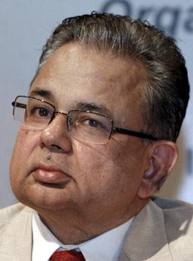
Justice Dalveer Bhandari defeated the 84-year-old Justice Florentino Feliciano of the Philippines in the elections held to fill the casual vacancy following the resignation of Awn Shawkat Al-Khasawneh from Jordan in October 2011. He will have six-year tenure. He is eligible for re-election for a second term of nine years at the end of the present term.
Justice Bhandari expressed his happiness on being elected to the ICJ. He said he secured 122 out of 197 votes in the General Assembly and 13 out of 15 votes in the Security Council.
He will be the third Asian representative in the 15-member ICJ. As per Article 8 of the ICJ statute the General Assembly and the Security Council elect a judge for the ICJ.
In the past, Sir Benegal Rau (1950s), Dr. Nagendra Singh (1970-80s) and Justice R.S. Pathak (1988-90), former Chief Justice of India, had served as Judges of the ICJ. Two persons served as ad hoc Judges namely: M.C. Chagla in a dispute with Portugal in the 1950s and Jeevan Reddy in a dispute with Pakistan in 2002.
The ICJ is the principal judicial organ of the United Nations. It consists of 15 Judges who serve for nine years. Out of 15 Judges, the distribution is 3 for Africa; 2 for Latin America; 3 for Asia; 5 for Western Europe and other States and 2 for Eastern Europe.
At present, among the 15 Judges on the Bench of ICJ, two representatives from Asia are: Hisashi Owada from Japan, who is also the president, and Xue Hanqin from China.
Supreme Court lawyer Mohan Katarki, an expert in international law and water disputes and one who is familiar with the working of the ICJ, told The Hindu “election of an Indian nominee to the ICJ with a proven judicial background may help in strengthening the institutional competence to handle complex disputes on environmental or ecological issues in the era of climate change possibility.”
Vast experience
Justice Bhandari (64) has vast experience in international law and is familiar with the working of the U.N. organisations. On April 21, 2009, he delivered the Key Note address on “Transnational Enforcement of Intellectual Property Rights” at the 5th International Judges Conference on Intellectual Property Law organised by the Intellectual Property Owners Education Foundation at Washington DC, U.S.A. He was nominated as a Member of “3rd High Level Indo-Australian Legal Forum Meet” held on 9th - 10th November, 2011 at New Delhi which consisted of Chief Justices, Judges, Attorney Generals from India and Australia.
He has been selected as one of the 16 most illustrious and distinguished alumnus in the 150 years (1859-2009) history of the Northwestern University School of Law, Chicago, U.S.A.
He was unanimously elected as President of the India International Law Foundation in 2007. He is continuing in that position. Justice Bhandari, who is due to retire in September, will have to resign as a judge of the Supreme Court to take up his new assignment.







Comments
Add new comment